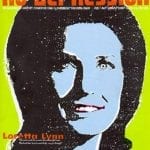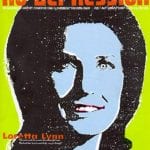Songs in the Key Of Strife: Social change strikes a musical chord at Tennessee’s Highlander Folk Center
As the center’s role in the civil rights movement diminished, its activity in Appalachia increased. Carawan moved with wife Candie to California and taught at a college; then the couple returned to aid Highlander’s efforts toward unionizing workers, fighting conditions that led to black lung, and deterring rampant strip mining.
The songs changed too, though a Guthrie-esque spirit remained. The Carawans collected Utah Phillips’ “Green Rolling Hills Of West Virginia”, John Prine’s “Paradise” and a slew of other songs of that time in a songbook called Voices From The Mountain, first published in 1975 and now available through University of Georgia Press. “These were songs taking up the side and telling the story of people whose land was being marked up and carried out by giant bulldozers,” Carawan said.”
West Virginia musician Carl Rutherford said those songs, along with older tunes like “Dark As A Dungeon”, brought people together. “They made their impact,” Rutherford remembered. “Look, that helped working people to stick together. Big bucks is in control of things. These people get a shoebox full of money and they’ll try to set their rules. The only way you can carry on a decent conversation with them is to gang together and find some strength in numbers.”
Rutherford later wrote a song called “Good Ol’ Boy” in which he sings, “I’m a gun-carrying, scab-burying good ol’ boy.”
While projects such as the Billy Bragg/Wilco collaborations have helped revive interest in Guthrie’s vision of folk songs as tools of empowerment, the saturation of popular culture into once remote areas has limited folk music’s scope of influence. “I’ve noticed it seems to be falling off,” Rutherford said. “I think it can still have impact, but it’s not like it used to be.”
Highlander remains a place for discussion, lately focusing on problems faced by immigrants in the region. “We’re always interested in looking at the groups most disempowered but still ready to take action,” said Candie Carawan, who, with her husband, remains a consultant at Highlander. “Immigrant workers newly arrived in the region are part of a target group, and Highlander is bringing people together to talk about what’s going on. We may have a Latino music festival this summer, though it will be very small-scale.”
The Center, though, is no longer a center. It is a righteous voice, but not a particularly loud one anymore.
“Things are different now, and music is different,” Guy Carawan said. “The 1960s was a special time, when songs moved from place to place. We’d hear music at a sit-in in Nashville, and then you’d go down to Albany, Georgia, and the songs would become much deeper and be closer to an older style of singing. It’s not that way anymore.
Carawan remains a wealth of musical knowledge, and his life’s work — using music to effectively reflect and influence social change — is impressive, important and criminally under-chronicled. But while music still drives a commercial train, it now sits at the back of America’s cultural bus. We’ll create many more ‘N Syncs and Shanias, but the Guy Carawans of the world are an increasingly endangered species.
“I don’t want to be in the role of thinking what needs to be done now,” he said. “People need to be meeting and strategizing about how they can protect what they need to protect. But I’m 72 years old now, and I’m not in the middle of it. This period, it’s not as clear cut.”
For more information on the Highlander Center, call 865-933-3443 or write to Highlander Center, 1959 Highlander Way, New Market, TN 37820.




